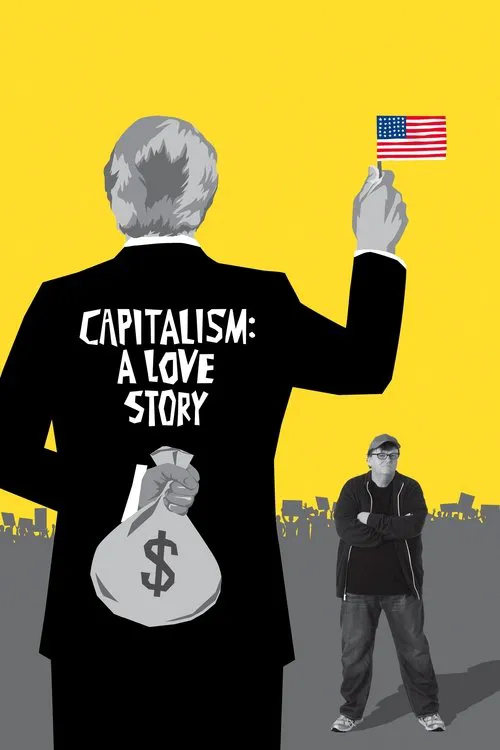Capitalism: A Love Story

Enredo
In "Capitalism: A Love Story," Michael Moore embarks on a journey to expose the devastating consequences of unchecked corporate power on the lives of ordinary Americans. The documentary filmmaker, known for his incisive critiques of capitalism and corporate America, delves into the dark underbelly of the capitalist system, revealing the ways in which it exploits and oppresses the working class. Moore begins by revisiting his own childhood, growing up in a working-class family in Flint, Michigan. He reflects on the struggles his family faced, from poverty to unemployment, and how the government and corporations seemed to turn a blind eye to their plight. This personal connection to the issue serves as a catalyst for Moore's investigation, as he sets out to understand the root causes of the problems he witnessed in his youth. Moore's research takes him to various locations across the country, including Detroit, where he visits abandoned factories and meets with former workers who lost their jobs due to corporate restructuring. He also journeys to the city of Flint, which has been ravaged by poverty, unemployment, and a toxic waste spill that has left residents with serious health problems. Throughout his travels, Moore encounters many ordinary Americans who have been affected by the policies and actions of corporations, highlighting the human cost of corporate dominance. One of the central themes of the film is the role of government in perpetuating corporate power. Moore argues that politicians, elected to serve the people, have instead become beholden to corporate interests. He cites numerous examples, including the bailout of banks and other financial institutions during the 2008 economic crisis, which benefited executives and shareholders but left ordinary Americans struggling to make ends meet. Moore also explores the history of capitalism, tracing its roots back to the Industrial Revolution and the rise of industrial capitalism. He examines the impact of capitalism on the environment, highlighting the devastating effects of industrial production on the world's ecosystems. He also delves into the world of credit and debt, showing how corporations and banks prey on vulnerable individuals, saddling them with high-interest loans and credit cards that perpetuate debt and financial insecurity. In addition to its critiques of corporate power and capitalism, "Capitalism: A Love Story" also offers alternative visions for a more equitable and just society. Moore profiles numerous community organizations and activists who are working to create positive change, from cooperatives and worker-owned businesses to community land trusts and credit unions. He also discusses the potential for social democracy and a more participatory economic system, where the power is given to the people, rather than corporations. Throughout the film, Moore employs his signature style, featuring vivid storytelling, witty commentary, and a healthy dose of satire. He also incorporates numerous interviews with ordinary Americans, who share their personal experiences of struggle and hardship under corporate-dominated capitalism. Moore's own presence is prominent throughout the film, often inserting himself into the narrative as a participant-observer, highlighting the complex relationships between himself, his subjects, and the issues he's investigating. Despite the gravity of the topics he tackles, "Capitalism: A Love Story" is ultimately a hopeful film. Moore argues that, even in the face of overwhelming adversity, ordinary people have the power to create change and build a more just and equitable society. By exposing the destructive consequences of corporate capitalism, Moore aims to inspire a movement for radical change, one that challenges the status quo and seeks to reinvent a system that serves the many, rather than just the few. In the end, "Capitalism: A Love Story" is a call to action, urging viewers to rethink their relationship with corporate power and to demand a more just and equitable economic system. As Moore reminds us, "Capitalism is not a system – it's an ideology... and it's time to rethink it."
Resenhas
Recomendações




